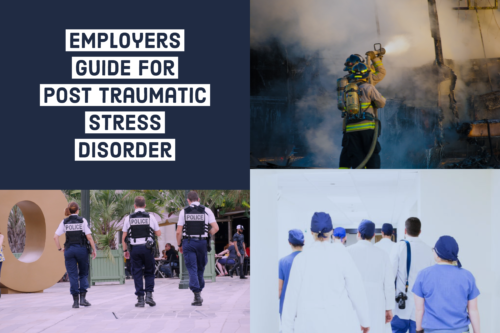Compared to workers without the disorder, those with Post-traumatic stress disorder have greater rates of work absenteeism, a higher number of medical appointments, an increased likelihood of unemployment and increased difficulty meeting work-related pressures. These outcomes constrain resources and finances, threats the company as well as its individual employees.
Most often PTSD is accompanied by another mental disorder most commonly major depressive disorder, anxiety disorders, and substance use disorder. PTSD is also associated with an increased risk of suicide attempt. These additional mental illnesses significantly contribute to increased rates of disability, workers compensation, absenteeism, presenteeism and productivity, consequently PTSD can have a negative effect on workers and workplaces.
As with any other physical illness, effective treatment outcomes depend on timely medical appointment and correct diagnosis from a mental health professional. It is important to know that not all people who experience trauma will develop PTSD or need treatment. Most people recover with the support of family, friends, loved ones or support from the community.
But for workers who do struggle with the Post-traumatic stress disorder, employers, human resource personnel, employee assistance programs and support from the mental health first aiders can make a significant difference in helping the person on and off the job.
Key Facts – Safework Australia
- Typical time off work for a work related mental disorder is 14.8 weeks.
- Average compensation payment per claim is $23,600
- Most at risk occupations- First responders, police services, paramedics and fire fighters, welfare and community workers, prison officers, bus drivers and rail drivers.
- 20% of workers compensation claims are due to PTSD.
- Each year 7820 Australian workers are compensated for a work-related mental condition.
- 46% of mental disorder claims are associated with a vehicle accident.
PTSD Compensation Claims
In all Australian jurisdictions psychological injury is only compensated if it arose out of or in the course of employment. Workers’ compensation laws qualify this further by stating that the employment must have been a significant, material, substantial or the major contributing factor to the injury.
Workers’ compensation payments work related psychological injury can include:
- medical expenses – doctors, psychiatrists, psychologists or counsellors
- loss of income
- costs associated with rehabilitation and return to work
- costs associated with reskilling for other employment opportunities or duties, or lump sum payment – permanent injury or disability
- Insurance premiums
Common occurrences of PTSD from work may include:
- PTSD from work related harassment and/or workplace bullying
- PTSD from work pressure
- PTSD from workplace or occupational violence
- PTSD from a work related accident/incident
In addition, some professions are at higher PTSD risk than others.
- PTSD in healthcare workers
- PTSD in social workers
- PTSD in defence force members, fire fighters and police, prison and security officers
What Can Employers Do?
PTSD can affect anyone regardless of gender, age, or job. Workplace settings are not treatment settings, and organizations should not try to replicate the role of a mental health service provider.
Workplace can help employees with PTSD by helping the employee to manage any physical, mental, or emotional limitations they may be experiencing.
Few Tips for Employers
- Provide work related instructions or job-related tasks in writing to help with concentration or memory difficulties.
- Allow employees to maintain flexible schedules to take time off for medical appointments.
- Provide additional time to complete non-urgent tasks.
- Allow employees to wear noise-cancelling headphones or provide quite rooms to reduce distractions while working.
- Increase the amount of light in the working environment to help increase the alertness and improve concentration.
- Where possible, removing environmental triggers that might remind the employee of the trauma and are upsetting.
- Make sure car parking areas have sufficient lighting or have security personnel (or another company employee) to escort anyone to their car who feels unsafe walking alone after dark.
- Referral to the company’s employee assistance program (EAP) is essential in providing workers access to a mental health professional for accurate diagnosis and timely treatment.
- Engaging Occupational Therapist who is specialised in Mental Health, in order to provide a safe working environment.
- Train the Managers and supervisors for the Mental Health First Aid Training, and provide sufficient amount of Mental Health First Aiders from all work group areas.
We need to understand that many people with PTSD may not ask for help, but employers can set the tone for the employees that asking for help and assistance is okay.
Training Managers and supervisors for the mental health first aid training creates a culture of understanding, awareness and compassion. Providing break rooms or group relaxation sends the message that, your organisation values the psychological and physical health of its employees.
Access Mental Health Awareness Books from Amazon: Mental Health Books












